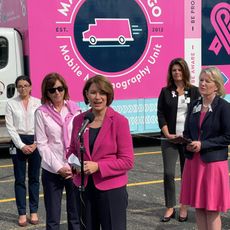A Nonhormonal Birth Control — for Both Men and Women— Is on the Horizon
The contraception of our dreams is closer than you think.

Perhaps the most unexpected outcome of the 2016 election was a rush on birth control. Fearing the end of the Affordable Care Act’s contraception benefit, women contacted their doctors, who, for each of the 30 business days following the election, performed about 700 more IUD and implant insertions than before the vote.
In the years since, things have only gotten worse. Republicans have repeatedly tried to repeal the benefit, and now states are passing laws to outlaw abortion before many women even know they are pregnant. As the all-out assault on reproductive rights continues, one thing is certain: We’re going to need better birth control.
Hormonal contraceptives on the market today aren’t bad—IUDs and implants are 99 percent effective—but they have long plagued many women with a litany of unwanted side effects: mood swings, weight gain, headaches, and blood clots, not to mention the sole burden of preventing pregnancy. What if there were a better way?

Polina Lishko and Nadja Mannowetz didn’t set out to invent a life-changing birth control when they began studying the mechanics of sperm together in 2012. But that’s what happened when they discovered that a common plant-based substance called lupeol, found on the skins of vegetables and fruits, is capable of blocking the protein on a sperm’s tail required to fertilize an egg.
Recognizing they could be on to something, the cell biologists at the University of California, Berkeley, formed YourChoice Therapeutics and got to work developing the world’s first nonhormonal unisex contraceptive. “The dream to have a nonhormonal birth control has been around; there was just no technology for how to do it,” says Lishko, 45. “It’s not a cure for cancer, but it will mean increased quality of life for billions of people.”

Lupeol, found on the skins of vegetables and fruits, is capable of blocking the protein on a sperm’s tail required to fertilize an egg.
By 2025, the company aims to have a product for women that can be applied to the vagina right before sex. It sounds too good to be true, but it could get even better. A version for men, likely a pill or cream, is slated to come out within 15 to 20 years. It will take longer because the male version is trickier to develop. “It is one thing to prevent ovulation of one egg once a month, but it’s a completely different scenario to disable thousands to millions of sperm cells,” explains Mannowetz, 45.
The demand for men’s birth control is high; a February study by the Male Contraceptive Initiative found 82 percent of men whose partners have had an unplanned pregnancy are interested in new methods of male contraception. But the choices are limited and the pharmaceutical industry has been slow to fund research. “When I went to school, boys didn’t even know how to spell contraception. They were like, ‘This is girl stuff,’ ” says Mannowetz. “Now, men actively ask for an option so that they can participate in family planning.”
Stay In The Know
Get exclusive access to fashion and beauty trends, hot-off-the-press celebrity news, and more.
The women see themselves as researchers, not inventors, but now they may go down in history as the mothers of the male birth-control pill. “It’s a huge breakthrough,” says Mannowetz. “These results are too precious to stay within the scientific community; this has the potential to change the world.”
This story appears in the October 2019 issue of Marie Claire.
RELATED STORY

The IUD Vs. The World
-
 Sofia Vergara Combines a Cherry Mocha Outfit with Winter's Buzziest Manicure Trend
Sofia Vergara Combines a Cherry Mocha Outfit with Winter's Buzziest Manicure TrendMinimal nail fans, rise.
By Ariel Baker Published
-
 Princess Lilibet Resembles Another One of Prince Harry's Relatives in Adorable Throwback Photo
Princess Lilibet Resembles Another One of Prince Harry's Relatives in Adorable Throwback PhotoThe Royal Family genes are exceedingly strong.
By Amy Mackelden Published
-
 Simple, Stylish, and Sophisticated—7 Easy Outfits You'll Want to Wear From Now Until Spring
Simple, Stylish, and Sophisticated—7 Easy Outfits You'll Want to Wear From Now Until SpringPlenty of inspo ahead.
By Judith Jones Published
-
 Senator Klobuchar: "Early Detection Saves Lives. It Saved Mine"
Senator Klobuchar: "Early Detection Saves Lives. It Saved Mine"Senator and breast cancer survivor Amy Klobuchar is encouraging women not to put off preventative care any longer.
By Senator Amy Klobuchar Published
-
 I'm an Egg Donor. Why Was It So Difficult for Me to Tell People That?
I'm an Egg Donor. Why Was It So Difficult for Me to Tell People That?Much like abortion, surrogacy, and IVF, becoming an egg donor was a reproductive choice that felt unfit for society’s standards of womanhood.
By Lauryn Chamberlain Published
-
 The 20 Best Probiotics to Keep Your Gut in Check
The 20 Best Probiotics to Keep Your Gut in CheckGut health = wealth.
By Julia Marzovilla Published
-
 Simone Biles Is Out of the Team Final at the Tokyo Olympics
Simone Biles Is Out of the Team Final at the Tokyo OlympicsShe withdrew from the event due to a medical issue, according to USA Gymnastics.
By Rachel Epstein Published
-
 The Truth About Thigh Gaps
The Truth About Thigh GapsWe're going to need you to stop right there.
By Kenny Thapoung Published
-
 The High Price of Living With Chronic Pain
The High Price of Living With Chronic PainThree women open up about how their conditions impact their bodies—and their wallets.
By Alice Oglethorpe Published
-
 I Used to Imagine Murdering the Men I Dated
I Used to Imagine Murdering the Men I DatedFalling in love helped me finally figure out why.
By Jessica Amento Published
-
 60 Workout Apps for Women Who Want Results (Without a Gym Membership)
60 Workout Apps for Women Who Want Results (Without a Gym Membership)Easy fitness plans you can follow without fear of judgment.
By Bianca Rodriguez Published